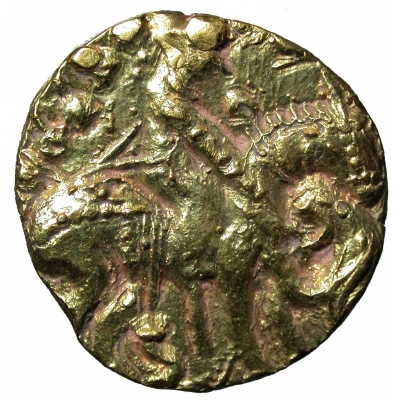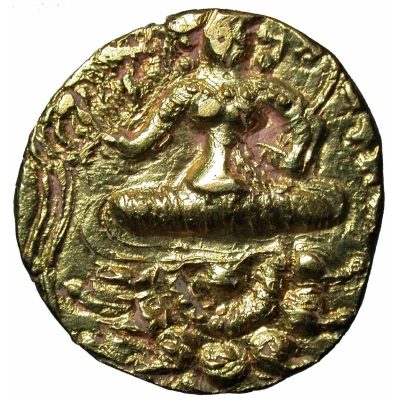


Dinar - Toramana Lion-slayer type, unknown
| Gold | 9.32 g | 19.5 mm |
| Issuer | Alchon Huns (Hunnic tribes) |
|---|---|
| Type | Standard circulation coin |
| Years | 490-515 |
| Value | Dinar (20) |
| Currency | Drachm (380-560 AD) |
| Composition | Gold |
| Weight | 9.32 g |
| Diameter | 19.5 mm |
| Shape | Round (irregular) |
| Technique | Hammered |
| Orientation | Coin alignment ↑↓ |
| Demonetized | Yes |
| Updated | 2024-10-10 |
| Numista | N#151017 |
|---|---|
| Rarity index | 100% |
Reverse
The nimbate goddess Lakshmi seated facing on lotus, holding long stemmed flower and riband, Sri Prakasadityah (a Royal name meaning "Light Sun") in field r.
Edge
Plain
Comment
References: Pankaj Tandon (“The Identity of Prakāśāditya,” Journal of the Royal Asiatic Society, Volume 24, Issue 4, October 2014 , pp. 557-572) has shown conclusively that Prakāśāditya was in fact the Hūṇa king Toramāṇa. Robert Gӧbl (“Das Antlitz des Fremden: Der Hunnenkönig Prakasaditya in der Münzprägung der Gupta-Dynastie,” Anzeiger der Österreichischen Akademie der Wissenschaften, Philosophisch-Historische Klasse, 126 (1990), pp. 131-138.) had already argued quite persuasively that Prakāśāditya was not a Gupta at all, but a Hūṇa king, and had speculated that he was none other than Toramāṇa; BMC pl.XXII, 1+; Friedberg 228a. An example from an Indian museum with more detail identifies the Hunnic King with an Inscription as Toramana, who was the Alchon Hun King from 493 to 515 AD.
Interesting fact
One interesting fact about the Standard circulation coin Dinar - Toramana (Lion-slayer type, unknown) (490-515) from Alchon Huns (Hunnic tribes) made of Gold weighing 9.32 g is that it features an image of a lion being killed by a horseman, which is a common motif in Scythian and Hunnic art. This coin is a rare example of the blending of Scythian and Hunnic cultural influences, as the Alchon Huns were a tribe that emerged from the blending of these two cultures.